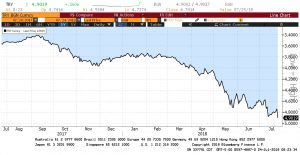Daily Comment (July 24, 2018)
by Bill O’Grady and Thomas Wash
[Posted: 9:30 AM EDT] It’s a quiet Tuesday so far. Equity markets are rising around the world and the White House has been mostly dormant this morning. Here is what we are watching:
Chinese stimulus: Since the mid-1990s, China has managed its economy for high levels of growth. Most of the growth until 2008 was driven by investment and exports. Since then, growth has been mostly a function of domestic investment, although there is growing evidence that consumption is improving as well. The key point is that China has been able to manage its growth by building debt. Although Chinese officials are acutely aware that debt capacity isn’t infinite, they also know capacity hasn’t been reached quite yet. In general, China tends to go through short cycles where it tries to slow the growth of its debt but then officials reverse course as the economy weakens to restore economic growth. We all know that there will come a time when this process cannot continue. At the same time, China has a mostly closed financial system and can still tap global financial markets for borrowing if it so chooses. To some extent, that would be the beginning of the end. So, as an informal rule, we have generally looked for China opening its debt markets to global investors as an indicator that we are nearing the apex of China’s borrowing capacity.
When Chairman Xi gathered power and extended his term limits, we wondered if he was preparing to tackle the debt problem. We still think he might. But, as is often the case, humans tend to prefer “Augustine’s dictum.”[1] In response to a slowing economy, China announced fiscal measures to support China’s economy.[2] This fits the aforementioned pattern; CPC officials simply appear to have no appetite for slowing growth. When growth slows, they react with policy stimulus which usually leads to higher debt levels. Chinese equities lifted on the news.
Turkey again: The Central Bank of Turkey left rates unchanged this morning, prompting a strong sell-off in the Turkish lira[3] to new record lows. The policy rate remains at 17.75%. The fear is that President Erdogan, bolstered by last month’s election, will curtail the central bank’s independence and bring higher inflation.

Iran: Yesterday, tensions between Washington and Tehran escalated. Not too much new has emerged this morning, although we do note that Turkey has indicated it won’t implement U.S. sanctions on Iran.[4] This development bears watching. The effectiveness of sanctions is based on the cooperation of foreign nations. During America’s superpower era, the U.S. used its military and economic power to compel compliance. Compliance was never perfect but, if the U.S. “leaned into” a sanctions regime, it could improve its effectiveness. This influence has grown over the year as financial globalization improved the effectiveness of sanctions because the U.S. was able to “weaponize” the dollar’s reserve role. Nations that needed access to the U.S. financial system were generally compelled to comply with U.S.-led sanctions. However, if a border nation isn’t all that dependent on the U.S. economy or security, it could mostly ignore sanctions, thus undermining their effectiveness.
Last year, Turkey exported $9.4 bn of goods to the U.S., while Turkey’s total exports were $166.0 bn, meaning the U.S. isn’t a huge factor in Turkey’s trade. Simply put, Iran will be able to continue to trade with Turkey, meaning oil will “leak” into global markets through this conduit. We will be watching to see if the Trump administration begins to lean on Turkey in light of its refusal to cooperate with Iranian sanctions. The U.S. does have tools at its disposal. The administration could increase its support of the Kurds, for example. It could refuse to sell Turkey arms (a deal for F-35s[5] is currently under scrutiny). However, given the fragile nature of Turkey’s financial system, the U.S. could prevent the World Bank or the IMF from aiding Turkey unless it complies with the U.S. At the same time, if conditions in Turkey deteriorate, don’t be surprised to see Turkey open the floodgates for Middle Eastern refugees, allowing them to move into Europe, which would increase political turmoil in the EU. There is the potential for things to go wrong the more the U.S. presses against Iran.
[1] “Lord, make me chaste, but not just yet…”
[2] https://www.reuters.com/article/us-global-markets/china-shares-hit-one-month-high-on-stimulus-hopes-bonds-tire-idUSKBN1KE023
[3] https://www.ft.com/content/5f389ec8-8f23-11e8-bb8f-a6a2f7bca546
[4] http://www.hurriyetdailynews.com/turkey-tells-us-delegation-it-will-not-implement-iran-sanctions-134928
[5] https://www.defensenews.com/smr/nato-priorities/2018/06/21/turkey-gets-first-f-35-as-congress-put-pressure-on-pentagon-to-stop-future-deliveries/


